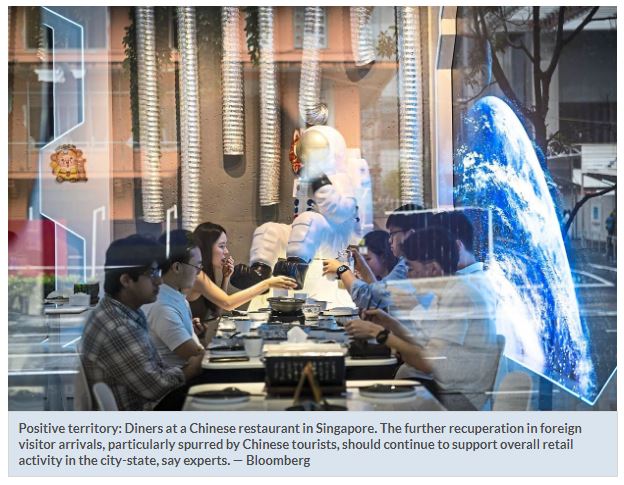Singapore: Retail sales rise for third straight month in April
SINGAPORE: Takings at the till rose for the third straight month in April, with the biggest increases coming from alcohol, cosmetics and toiletries as tourist arrivals grew, though overall sales continued to decelerate.
Retail sales climbed 3.6% from the same month a year ago, cooling from the 4.5% increase seen in March, and a 12.6% jump in February that was partly due to the timing of Chinese New Year.
The estimated total retail sales value in April was S$3.9bil (RM13bil), according to figures released by the Department of Statistics on Monday.
Of this, online retail sales made up an estimated 12%, lower than the 13% recorded in March.
DBS Bank economist Chua Han Teng said the expansion in retail sales for the third straight month was highly supported by the ongoing recovery in international travel, as seen from food and alcohol sales, which have stayed robust.
“We think further recuperation in foreign visitor arrivals, particularly spurred by Chinese tourists, should continue to support overall retail activity.
“That said, there were some signs of cautious discretionary spending amid an uncertain economic environment, observed from the deceleration in motor vehicle sales growth, and weak furniture and household equipment sales,” he said.
Excluding motor vehicles, retail sales grew 4.2%, larger than the 4% increase in March.
Month on month, April’s overall takings inched up 0.3% from March on a seasonally adjusted basis. This compares with a 2.2% increase from February to March.
Retail sales grew year-on-year (y-o-y) in April for most categories, with food and alcohol seeing the largest increase of 30.5% and cosmetics, toiletries and medical goods coming in second at 16.8%.
The growth was buoyed by higher demand for alcoholic products, and cosmetics and toiletries, including those sold at duty-free shops. Takings of apparel and footwear rose 13% as consumers shopped for more clothes.
However, sales at petrol service stations slid by 14.2%, while turnover for furniture and household equipment, motor vehicles, and computer and telecommunications equipment fell between 0.1% and 1.2%.
OCBC Bank chief economist Selena Ling said the drag on petrol service station receipts is likely tied to rising car prices.
The soft patch seen in furniture and household equipment, on the other hand, reflects that workers are returning to the office, while lower sales of computer and telecommunications equipment are linked to the ongoing global electronics downturn, she added.
Meanwhile, the food and beverage service sector also saw continued growth, but at a slightly slower pace.
Sales rose 15.1% y-o-y in April, following a 17.7% increase in March.
Food caterers registered the largest growth in sales, at 61.4%, due mainly to higher demand for both event and in-flight catering.
The increase was lower than the 77.4% seen in March and 101.5% in February.
Ling said hospitality-related industries should stay resilient in the second half of 2023, given a sustained pickup in visitor arrivals since March. This comes even as “China’s pace of reopening has been disappointing of late”.
Retail sales might come under pressure in the coming months if the external economic environment does not improve and the domestic labour market softens more than expected, she added. — The Straits Times/ANN


 Thailand
Thailand




